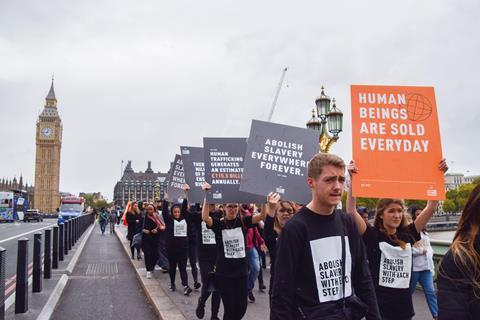‘One problem I see often is that victims of modern slavery who are fortunate enough to have representation are represented by a number of solicitors – one for immigration matters, one to challenge National Referral Mechanism decisions and support, and one to challenge criminal convictions. All of the issues overlap and need to be considered holistically to achieve the best possible outcome for the client, but this rarely happens.’

These were the words of one of the barristers who participated in our research into access to legal advice for people with lived experience of modern slavery in the UK. The project, funded by the Modern Slavery and Human Rights Policy and Evidence Centre, was carried out by the British Institute of International and Comparative Law (BIICL) in partnership with the anti-slavery charity Unseen UK, and with people with lived experience of modern slavery.
Our research found that many people with lived experience of modern slavery struggle to access legal advice relevant to their complex and wide-ranging needs. What is more, even when they overcome access barriers, the legal advice they receive often fails to respond to all of the issues they need support with and can be presented in a way that is not sensitive to their wellbeing.
A lack of quality advice can impact on every area where people with lived experience are in touch with the legal system, from identification as a victim, to immigration and asylum processes, compensation, involvement in criminal proceedings (whether as the accused or as a victim), family matters, and access to mainstream services. It can also directly affect recovery and wellbeing by contributing to ongoing uncertainty and anxiety. We also found that some of those who feel frustrated by a lack of publicly funded legal advice sometimes turn to private legal advice instead, which can leave them in debt and increase their vulnerability to retrafficking or further exploitation.

Challenges in accessing quality legal advice stem mainly from issues relating to the supply of legal aid, awareness of rights, and problems with practical support to access this advice. Cuts to legal aid funding have reduced the number of legal service providers with expertise on modern slavery issues in the UK, with many operating at full capacity and therefore unable to take on new cases. There are many problems for policymakers to solve, including revising the legal aid funding structure to make sure lawyers are not financially and otherwise disincentivised from taking on complex claims such as those often brought by those who have experienced modern slavery.
Yet access alone is not enough. Quality advice is critical to ensuring promising outcomes – bad advice is worse than no advice. The research identified several components of what quality advice means in this context. The key components include the adoption of a holistic approach to legal advice provision, technical expertise, effective and trauma-informed communication, and the timeliness of that advice.
A holistic approach is critical. It addresses the broader aspects of the client’s wellbeing and considers both their legal and non-legal needs in the long term. It does not focus exclusively on securing immediate outcomes that are unlikely to provide sustainable solutions, such as short-term grants of leave to remain. It necessitates a coherent strategy, close coordination with support providers and effective communication with the client.
Addressing the full range of the client’s legal needs requires technical expertise applicable to modern slavery situations and an ability to identify pertinent legal issues and refer these to other practitioners, while continuing to holistically support the individual. At the same time, people with lived experience of modern slavery also identified a lack of regular communication with their legal representatives as a major source of anxiety and stress. It led some clients to believe their case was not being prioritised and exacerbated mistrust rooted in their experiences of exploitation.
Effective communication is a critical component of a holistic approach that places the wellbeing of the client at its centre and is also pivotal in managing expectations and ensuring clients’ full involvement, so that they can make informed decisions. Such communication must be trauma-informed, recognising that clients may not be able or want to disclose their full range of experiences, and may find it difficult to articulate their needs due to linguistic, cultural or other barriers.
Promising practices exist and provide a good source of learning for providers of legal advice. These include building dedicated programmes designed to provide access to specialised advice for people with lived experience of modern slavery that cover the whole range of their needs, and are accessible before they decide to enter the National Referral Mechanism. Other good practices include training and mentoring of legal practitioners provided by organisations specialising in supporting people with lived experience of modern slavery to improve technical expertise and promote trauma-informed practices. Working with others is critical. Legal service providers should build partnerships with NGOs, frontline organisations, local authorities and others to promote a holistic approach to legal advice provision; and to enable timely, supported referrals and the building of trust between the client and all parties involved.
As lawyers, we can help and have a responsibility to do so.
Dr Jean-Pierre Gauci is a senior research fellow in public international law and director of teaching and training at BIICL































No comments yet